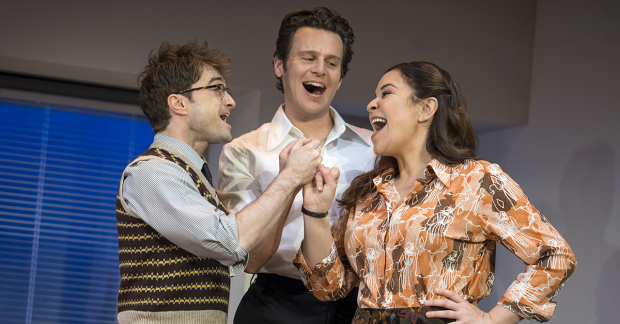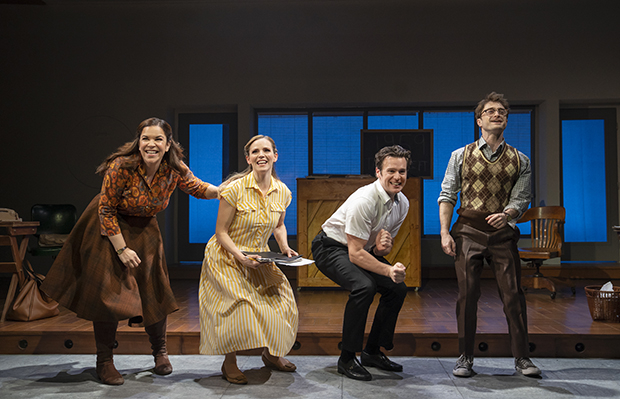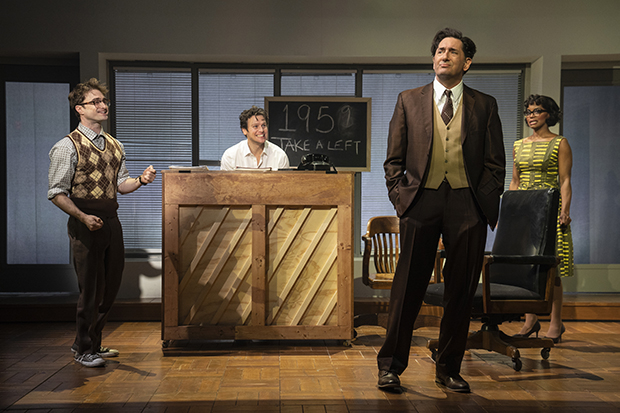Review: Jonathan Groff, Daniel Radcliffe, and Lindsay Mendez in a Revelatory Merrily We Roll Along
Maria Friedman’s hit West End staging of the Sondheim-Furth musical receives its long-belated New York premiere.

(© Joan Marcus)
"Dreams don't die," they sing, their words as much a reflection on their own lives as our wishes for the play world they're inhabiting. Merrily We Roll Along, that famous flop, has never completely worked — not in Harold Prince's original production, not fully in any of the five subsequent revivals I've seen — but our desire for Stephen Sondheim and George Furth's heartbreaker of a musical to feel greater than the sum of its parts never wanes. And now, at New York Theatre Workshop, this aspiration is finally realized.
Something is stirring on East 4th Street, where Maria Friedman's reputation-redefining Merrily has transferred, 10 years after its premiere, from London's Menier Chocolate Factory. Friedman — herself a veteran of the show as an actor — rescues the property from the "excellent score, bad book" files, and, using the now-standard version fashioned by Sondheim and Furth after the Broadway closing in 1981, creates a piece that feels remarkably whole. The result is musical-theater heaven in a two-and-a-half-hour package. I didn't want it to end. Err…start.
Yes, Merrily is famously told backwards, much like the drama by Kaufman and Hart that inspired it. It begins (well, finishes) in 1976 at the swanky manse of composer-turned-movie producer Franklin Shepard (Jonathan Groff), who is celebrating the release of his latest picture with his sycophantic Hollywood pals. Frank has it all, but does he really? His ex-wife Beth (Katie Rose Clarke) took him to the cleaners; he's estranged from his son (Carter Harris, alternating with Colin Keane); and his current marriage, to his Broadway star former paramour Gussie (Krystal Joy Brown), won't survive the night.
Frank is also divorced from his best pals. Once the musical half of a wildly successful Broadway songwriting team, his longstanding partnership with lyricist Charles Kringas (Daniel Radcliffe) ended after Charley embarrassed him on national television. The third in their triumvirate, novelist/drama critic Mary Flynn (Lindsay Mendez) has turned into a self-destructive alcoholic after spending 20 years secretly loving Frank. Furth and Sondheim gradually peel back the layers to reveal the choices that led them to their current states, until Frank, Charley, and Mary have their first meeting as idealistic young dreamers on a rooftop in 1959.
It's the reverse chronology that so often renders the show unplayable; namely, the actors hitting the emotional beats necessary to get from the desperation of the first act to the optimistic innocence of the second. Friedman, who first staged this Merrily as a student production in 2010, isn't hung-up on the tricksiness of the book. She refocuses it as a memory play, where Frank's past experiences come to life around him in his house in the Hills (through the glow of Amith Chandrashaker's lighting, you can practically imagine the Hollywood sign taunting him in the background of Soutra Gilmour's moneyed set). This choice not only makes sense of the unconventional storytelling, but makes the back half of the show, before the three friends have been corrupted by life and success, even more devastating than usual, especially in the hands of the three best pals at the center.

(© Joan Marcus)
Groff, Mendez, and Radcliffe are the other reason for the production's sterling success. Giving career-best performances, not only do they have palpable chemistry, but you actually buy them as friends (and I've seen this show plenty of times where you don't). You can sense the gut-punching disappointment when their relationships come crashing down, and the palpable joy they find in the successes that paved the way. They sing the absolute hell out of Sondheim's best score; "Old Friends,""Opening Doors," and "Our Time" have never sounded better.
Radcliffe's adorably bashful Charlie is filled with nervous energy, which he uses to huge success in "Franklin Shepard, Inc.," a number that absolutely brings down the house. On the page, Frank is a cipher, and you never really know what makes him tick. Groff grounds him in the reality of a man who watched all his dreams come true, and it's only after he reaches the height of his powers that he realizes it's not what he wants at all.
It's Mendez who's the revelation, though, making a three-course meal out of Mary when all Furth left was hors d'ourves. That she finds so much nuance in a relatively one-note role is a testament to her intelligence as an artist.
The supporting performances are a little rougher around the edges. Furth left some sharp lines as crumbs for Gussie, the Broadway star who steals Frank away from his wife, but Brown doesn't use them as well as Mendez does; she plays the stock villain to good effect but doesn't add much. Reg Rogers could come on a little stronger as Joe Josephson, the Broadway producer who (while still married to Gussie) first took a chance on Frank and Charley. Clarke could use a little more color here and there, too, but her "Not a Day Goes By" is filled with the perfect amount of crushing disappointment.
Conductor Alvin Hough Jr. brings the best out of his nine-piece band, which plays Jonathan Tunick's orchestrations with such verve that they sound three times the size (Kai Harada's sound design, allowing us to hear every instrument, is on par). Gilmour's stylish costumes and Cookie Jordan's wigs are fascinating, realistically declaring the changing tastes and styles of the passing years and decades.
Is this Merrily We Roll Along as it was meant to be all along? I think so. Friedman's production is something of a miracle, finding the beating heart at the center of a story about friendship, dreams, regrets, and times gone by. They have a good thing going, indeed.

(© Joan Marcus)









